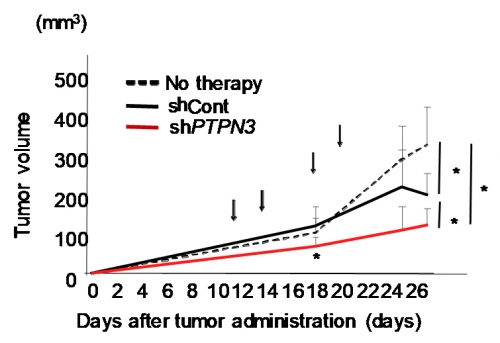研究成果 Research Results
- TOP
- News
- Research Results
- Unleashing immune cells to fight cancer
Unleashing immune cells to fight cancer
A possible new path to cancer immunotherapy using non-antibody-type inhibitors found 2019.11.05Research ResultsLife & Health
Researchers now have evidence that targeting a previously identified protein may provide a new switch to unlock the full potential of cells in the immune system to better fight cancer, possibly leading to new treatment methods with less side effects and lower costs.
When intrusions in the body are detected by the immune system, a type of white blood cell called a T cell—so named because it is generated in the thymus—changes into an activated state and attempts to defeat the intruders. To control and moderate the response in the activated state, a variety of molecules and proteins in the cells act as checkpoints.
However, researchers have been investigating if these checkpoints can be released by introducing a molecule that acts as an “immune checkpoint inhibitor” to get T cells to attack cancer cells as a new means for cancer treatment.
The immune checkpoint inhibitors studied to date have all been a form of antibody, a type of molecule that already plays a key role in the immune system, so there has been an interest in non-antibody inhibitors to possibly avoid side effects and decrease treatment costs seen so far with this approach.
In a study published online by Cancer Immunology, Immunotherapy on September 27, researchers at Kyushu University reported that targeting a protein called PTPN3 may provide a path to finding such an inhibitor.
“While previous results suggested PTPN3 may restrict T-cell function, there were no tests to show that removing it would actually help unleash human T cells to attack cancer,” says Hideya Onishi, who led the research.
In the study, the researchers showed that using methods to reduce PTPN3—which is short for protein tyrosine phosphatase non-receptor type 3—enhanced the activity of certain activated T cells, causing them to travel further and kill more unwanted cells.
Suppressing the production of PTPN3 in therapy experiments using patients’ tumors and T cells significantly increased the number of T cells that infiltrated the tumors and the T cells’ deadliness. This enhanced activation by PTPN3 suppression was observed only in T cells already activated by a cluster of molecules called CD3+ and not in resting T cells.
“Our results imply that PTPN3 acts as an immune checkpoint in activated T cells, providing a new target for cancer therapy with non-antibody-type immune checkpoint inhibitors,” states Onishi.
For more information about this research, see “PTPN3 expressed in activated T lymphocytes is a candidate for a non-antibody-type immune checkpoint inhibitor,” Akiko Fujimura, Kazunori Nakayama, Akira Imaizumi, Makoto Kawamoto, Yasuhiro Oyama, Shu Ichimiya, Masayo Umebayashi, Norihiro Koya, Takashi Morisaki, Takashi Nakagawa, and Hideya Onishi, Cancer Immunology, Immunotherapy 68, 1649 (2019), https://doi.org/10.1007/s00262-019-02403-y

Fig. 1. Tumors formed in mice injected with tumors from humans were significantly smaller when given T cells treated to reduce PTPN3 production (shPTPN3 group). Activated T cells were administered at 11, 14, 18, and 21 days after tumor injection (arrows).

Fig. 2. The number of CD3+ tumor-infiltrating-administrated T cells was significantly greater in the group treated to suppress PTPN3 (shPTPN3) than in the control group (shCont).
Journal Reference
PTPN3 expressed in activated T lymphocytes is a candidate for a non-antibody-type immune checkpoint inhibitor, ,Cancer Immunology, Immunotherapy, https://doi.org/10.1007/s00262-019-02403-yResearch-related inquiries
- TOP
- News
- Research Results
- Unleashing immune cells to fight cancer































